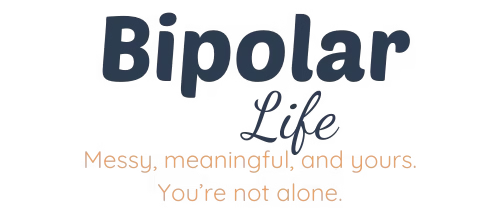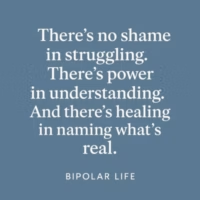🎯 Identifying Triggers Without Blame
The word “trigger” can feel heavy. It’s often used like an accusation—“You’re triggered again?”—or as if it’s proof you’re weak or overreacting. But triggers aren’t signs of failure. They’re information. They’re signals your brain and body send that something is shifting, often before you’re even fully aware of it.
Triggers are not bad, but learning your specific ones can make navigating life easier. Knowing how you will react to something prepares you to handle the situation in the best way for you. Triggers are deeply personal and unique—what sends one person spiraling might barely affect someone else.
When you live with bipolar, understanding your triggers isn’t about blaming yourself—it’s about recognizing patterns so you can plan ahead, soften the impact, and give yourself the tools to stay steady.
🔍 What Triggers Look Like in Bipolar
Triggers can range from obvious life events to the subtle shifts you barely notice until later. Some of the most common triggers for bipolar episodes include:
- Sleep disruptions: Losing even a few hours of sleep can push someone toward mania or deepen depression.
- Relationship stress or conflict: Arguments, breakups, or even ongoing tension can destabilize moods.
- Seasonal changes: Shifts in daylight can bring on depressive episodes in winter or trigger mania during bright summer months.
- Hormonal cycles or illness: Physical health directly impacts mental health—especially with bipolar.
- Major life events: Grief, job changes, moving, or financial strain can shake your stability, even when they’re positive changes.
Understand that even these triggers may only be a symptom of a deeper trigger. For example, if I burn dinner, I might feel bad about it, which leads to tossing and turning all night. That lack of good sleep can then start the spiral toward depression. I can’t know in advance that I’m going to burn dinner, but I can remember that my lack of sleep might be the point where things begin to slide. Even though it looks like the sleep disruption is the trigger, it isn’t the true root—it’s a chain reaction.
🪶 Micro-Triggers: The Subtle Stuff
Not all triggers are dramatic or obvious. Sometimes, it’s the small, everyday moments that quietly chip away at stability. These “micro-triggers” can be easy to dismiss in the moment, but over time, they add up.
Examples of micro-triggers include:
- Social rejection or exclusion: A friend not responding to a text, feeling left out of plans.
- Overcommitment: Saying “yes” too often and stretching yourself thin.
- Sensory overload: Crowded rooms, loud noise, or constant background stress.
- Sensory deprivation: Long stretches of isolation or lack of stimulation.
- Routine disruptions: Even small changes—like skipping meals or missing exercise—can shift mood balance.
It’s not always one thing—it can be many micro-triggers happening at once. For example, you go to an event: it’s too loud, you don’t know anyone, and you’re out later than usual. Each of those factors alone might be tolerable, but stacked together, they can cascade into a bigger emotional reaction or mood shift.
🔗 Separating Cause from Correlation
It’s important to remember that triggers don’t “cause” bipolar—they interact with it. That interaction can be good, bad, or even a mix of both. Lack of sleep doesn’t create bipolar disorder, but it can intensify or set off a mood episode if you’re already vulnerable.
Think of it like a sprained ankle: stepping off a curb isn’t what injured you in the first place, but it can make an old injury flare up painfully. Just like a sprained ankle, you might need a brace or some pain medication. Just because it’s a mental health issue doesn’t make it any less of a health issue.
Learning to see these connections isn’t about blaming yourself for the trigger or the episode. It’s about building awareness so you can step in earlier, adjust, and protect your stability before things spiral further. Knowledge is power. In this case, it’s the power of living a life without feeling like you’re constantly falling. These connections give you a road map so you don’t run headfirst into cliffs and valleys.
🧭 Building Awareness
Awareness isn’t about obsessing over every emotion—it’s about gently noticing your patterns so you can respond with care instead of panic. It’s being aware of your rhythms. Those rhythms may be a routine, a schedule, or simply how you interact with others. Start with what feels manageable: a note in your phone, a color-coded calendar, or a few words in a journal.
Pay attention to things like:
- Changes in your sleep or energy
- Shifts in how you relate to others
- A sudden burst of irritability or restlessness
- That quiet “something feels off” gut feeling
The goal isn’t to control everything—it’s to recognize when something might be shifting before it becomes overwhelming. You don’t have to catch every trigger in real time. Even noticing patterns in hindsight gives you valuable insight for next time.
I’ve created tools to help others gain this kind of awareness. If you’d like to explore them, visit PlannerAP and use the code BIPOLARLIFE to get $5.00 off any tool that might help you.
🌱 Awareness Brings Freedom
Identifying triggers isn’t about living in fear or hyper-analyzing every move—it’s about reclaiming control. When you understand what nudges your moods, you give yourself the chance to plan ahead, steady yourself, and even soften the impact before it grows into something bigger.
This isn’t about perfection—it’s about progress. Over time, awareness becomes second nature. You start to notice the rhythms in your life, anticipate your needs, and catch yourself before the spiral gets too steep. The goal isn’t to avoid every peak or valley, but to navigate them safely, with fewer bruises along the way.
You don’t have to figure it all out at once. Start small, stay curious, and remember that every step toward understanding yourself better is a step toward stability.
✍️ Reflection Prompt
“What’s one trigger—big or small—that I’ve noticed in the past month? How could I prepare for or soften its impact next time?”


